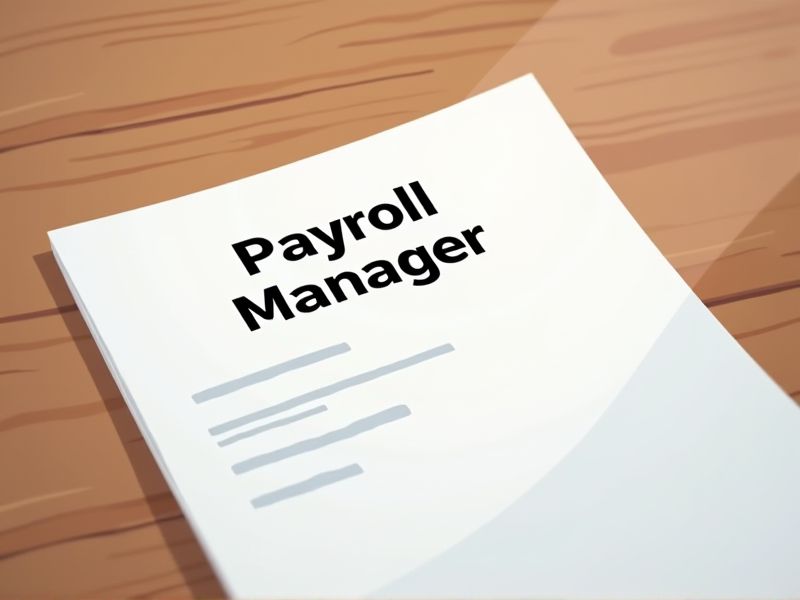
A Payroll Manager plays a crucial role in ensuring accurate and timely compensation, but without certification, they may lack critical knowledge of compliance and tax regulations. Certifications validate expertise in using payroll software, understanding complex labor laws, and managing sensitive employee data efficiently. They also enhance credibility and professional growth, which can lead to improved career prospects and organizational trust. Consider these essential certifications that could benefit a Payroll Manager.
Certified Payroll Professional (CPP)
A Payroll Manager requires a Certified Payroll Professional (CPP) credential to ensure compliance with complex and evolving tax laws, reducing the risk of penalties. This certification signifies a comprehensive understanding of payroll systems, which enhances the accuracy and efficiency of payroll processing. The CPP credential demonstrates commitment to professional development, which can enhance trust among stakeholders. Holding this certification can provide a competitive edge in the job market, attracting opportunities for career advancement.
Fundamental Payroll Certification (FPC)
Acquiring the Fundamental Payroll Certification (FPC) demonstrates a solid grasp of essential payroll concepts and regulations, which is crucial for a Payroll Manager's role. This certification ensures that the manager is well-versed in compliance, minimizing the risk of legal and financial penalties for the organization. With an FPC, a Payroll Manager can efficiently oversee payroll functions, leading to streamlined operations and accurate employee compensation. The certification enhances the manager's credibility, boosting confidence among team members and stakeholders.
Professional in Human Resources (PHR)
A Payroll Manager needs expertise in human resources regulations and compliance, which is a core component of the Professional in Human Resources (PHR) certification. PHR certification equips the Payroll Manager with knowledge of employment laws, critical for managing payroll accurately and legally. The comprehensive insights gained from PHR enhance decision-making related to compensation, benefits, and employee relations. Having a PHR-certified Payroll Manager reduces risks associated with legal penalties and improves organizational compliance standards.
Senior Professional in Human Resources (SPHR)
The SPHR certification provides comprehensive knowledge in strategic planning and policy development, crucial for a Payroll Manager overseeing complex compliance regulations. With this credential, a Payroll Manager can effectively design compensation frameworks aligned with organizational goals. The SPHR certification equips the manager with dispute resolution skills, essential for handling employee grievances related to payroll issues. The understanding of workforce trends gained through SPHR ensures the Payroll Manager can anticipate and adapt to future labor market changes.
SHRM Certified Professional (SHRM-CP)
Obtaining a SHRM Certified Professional (SHRM-CP) certification enhances a Payroll Manager's strategic understanding of human resource issues, aligning payroll processes with broader HR strategies. The certification provides up-to-date knowledge of employment laws, ensuring the payroll practices remain compliant with legal standards. Having SHRM-CP credentials can improve collaboration with HR departments, facilitating better communication and integration between payroll and HR functions. It also elevates professional credibility, potentially increasing trust with both employees and organizational leadership.
Certified Compensation Professional (CCP)
A Certified Compensation Professional (CCP) provides a payroll manager with expertise in developing competitive compensation packages, which can enhance employee retention and recruitment. Understanding pay structures and incentive plans helps align payroll operations with organizational financial goals. CCPs bring a deep understanding of compliance-related issues, reducing the risk of costly legal penalties for the company. Having a CCP ensures a strategic alignment of payroll processes with broader human resource objectives, optimizing overall workforce management.
Certified Public Accountant (CPA)
A Certified Public Accountant (CPA) is essential for a Payroll Manager due to their expertise in tax regulations, ensuring compliance and avoiding legal penalties. With their knowledge in financial accounting, CPAs provide accurate financial reporting, crucial for organizational transparency. Their analytical skills facilitate efficient payroll audits, identifying discrepancies and optimizing payroll processes. They also play a critical role in strategic financial planning, directly influencing a company's financial health and employee satisfaction.
Global Payroll Management Certification (GPMC)
Global Payroll Management Certification (GPMC) enhances a payroll manager's expertise in handling complex international payroll systems, ensuring compliance with diverse regulatory requirements. The certification provides structured knowledge about varying tax laws, labor regulations, and financial practices across different countries, crucial for minimizing risks and errors. It signals a professional's competence and commitment to maintaining standardized payroll processes in a global setting, thus increasing organizational trust and efficiency. With an ever-evolving global economy, such specialization becomes essential to adapt to technological advancements and policy changes in payroll management.
QuickBooks Certification
QuickBooks Certification enhances a Payroll Manager's ability to efficiently manage financial data and streamline payroll processes. With certification, a Payroll Manager gains advanced skills in navigating the software, reducing errors and improving accuracy in financial reporting. Employers often prefer certified individuals, attributing to increased job prospects and demonstrating credibility in managing complex payroll tasks. Certification ensures compliance with tax laws and regulations, safeguarding the organization from potential legal setbacks.
Advanced Excel Certification
Advanced Excel Certification enhances a Payroll Manager's ability to analyze large sets of data efficiently, which improves accuracy in payroll processing. Familiarity with complex Excel functions can aid in creating sophisticated financial models and reports, streamlining decision-making processes. Certification demonstrates a commitment to professional development, which can lead to better job opportunities and career growth. Mastery of Excel also reduces the likelihood of errors in payroll calculations, enhancing overall organizational compliance and employee satisfaction.
Summary
When you obtain certifications as a Payroll Manager, your expertise and credibility within the organization will be significantly enhanced. Acquiring these credentials can lead to increased efficiency in handling payroll processes, reducing errors and improving compliance with regulations. This certified status often results in greater trust from both employees and management, fostering a more stable and positive work environment. As a result, your career prospects and potential for advancement within the field are likely to expand, opening up opportunities for higher-level positions or specialized roles.
